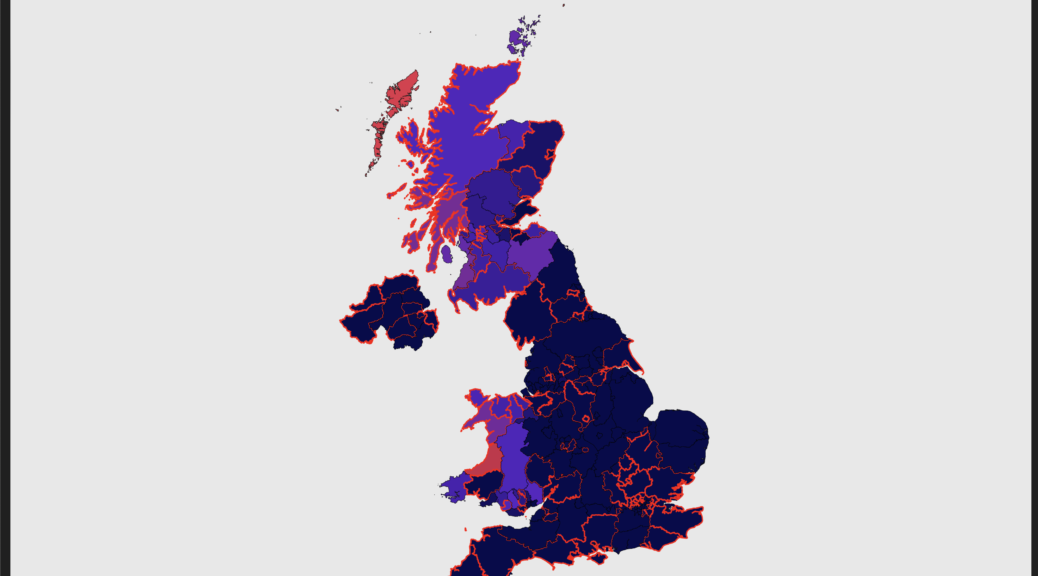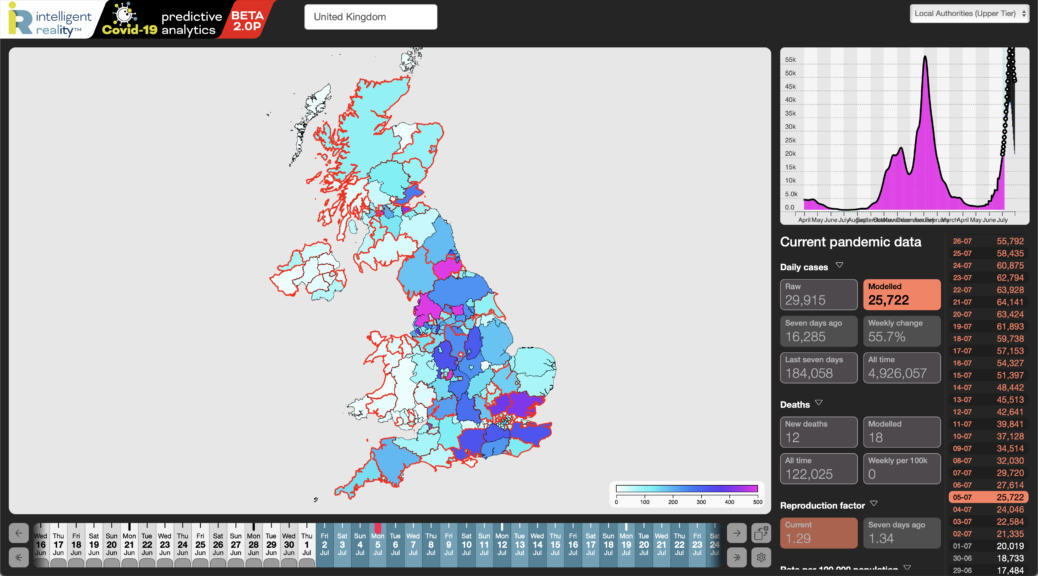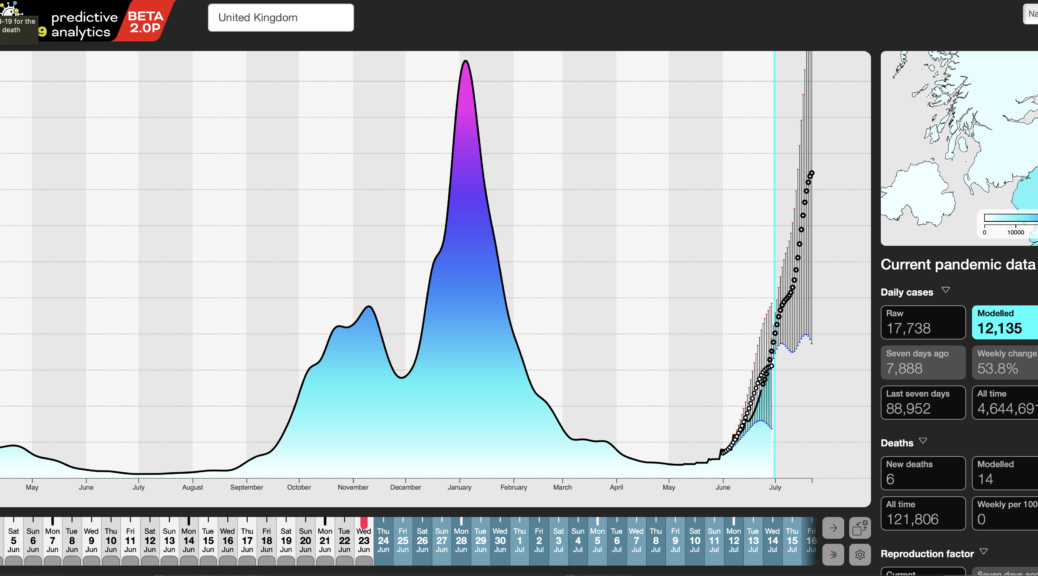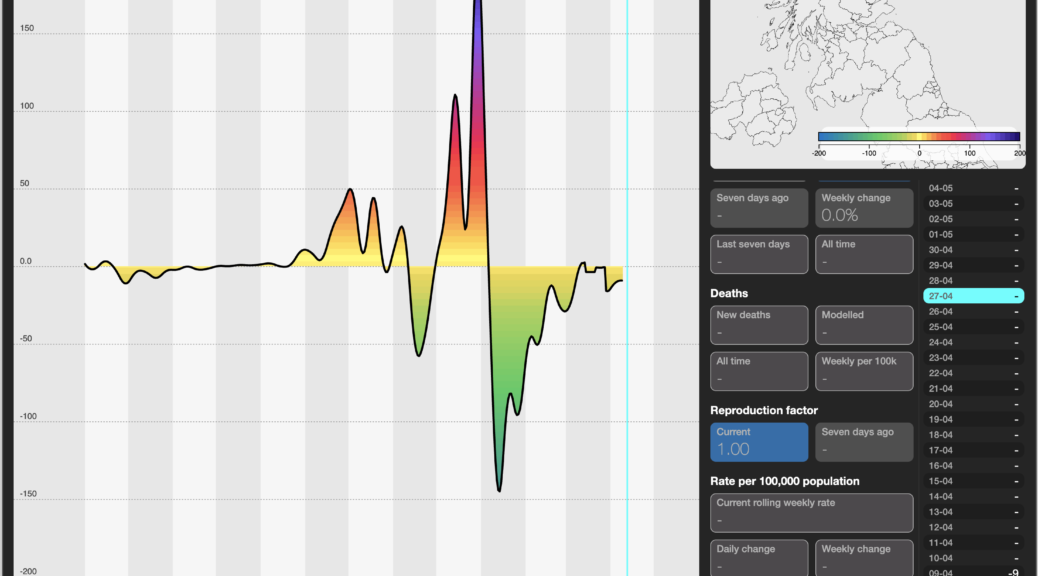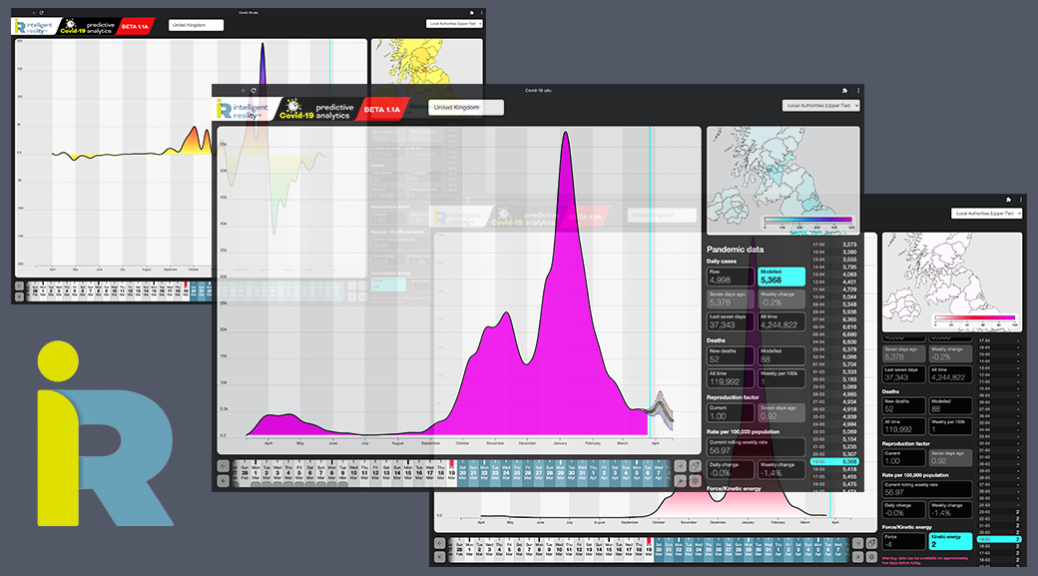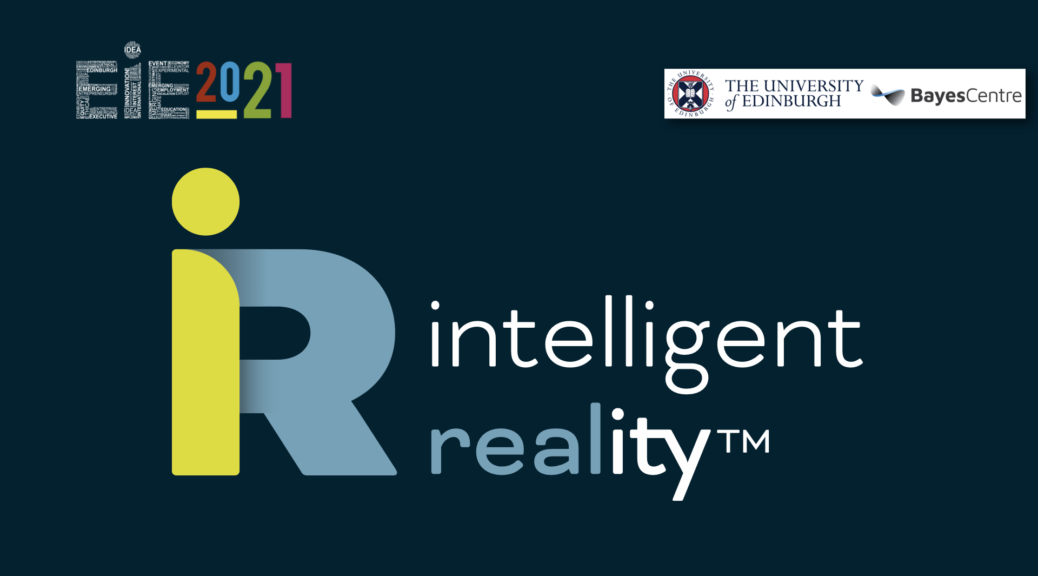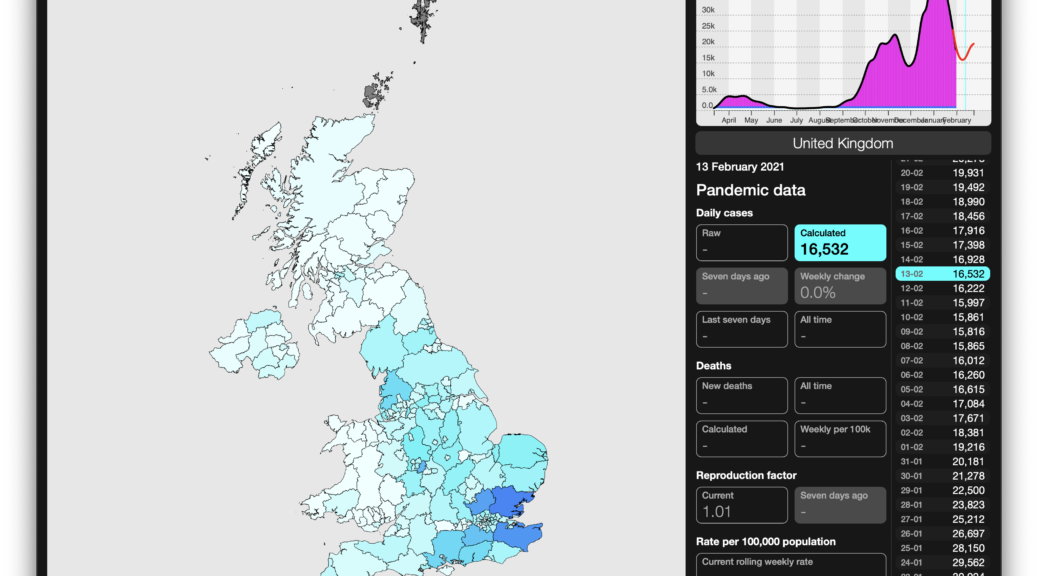The UK’s ‘Prime Minister’ stood up in Parliament today and stated that “Provided the current encouraging trends in the data continue“, Covid-19 restrictions in England would be lifted by the end of the month. At Intelligent Reality, we’re not entirely sure to which data he refers – possibly those from his home dimension? In looking at the published official data, we’re coming to rather different conclusions.
Tag Archives: Artificial Intelligence
Third Wave Rising
We’ve already shown that our forecasting system has been effective in providing advance warning of the current Third (or Fourth, depending on how you’re counting) wave of Covid-19 cases. With that wave now fully established, we’re looking again at our forecasts, the core data and our dynamic analyses of the pandemic, especially given the latest UK government policy.
With the UK’s rolling weekly case rate now at 238/100k population, up 60% on a week ago, and 40% of the way to the January national peak, we are not reassured. Looking at the behaviour of Chris Whitty’s eyebrows during government briefings, we suspect that neither is he. The current wave is so far unevenly distributed, with urban centres showing the biggest rises, in many cases well above the January peak with, as previously noted, an apparent strong association with those areas most engaged in the Euro 2020 competition. Given little restriction on movement, we believe that these centres of infection are in the process of seeding a ripple of infection across the rest of the country. Continue reading Third Wave Rising
How accurate are our forecasts?
Taking the current rise in infections as an example, our analytic system has, consistently been able to forecast changes in the Covid-19 pandemic across the UK – we started with 14-day forecasts and have now pushed those out to 28 days. We made that change as we improved our algorithms, validated our earlier forecasts and, of course, as our system has had more historical data to work with, it’s got somewhat better at its job.
To validate the forecasts, we measure their daily predictions against what subsequently transpired – these can be displayed in our dashboard by clicking the grey tabs below each date in the horizontal date picker at the bottom.
For that period then, we have forty four 28-day hindcasts, plus the current forecast, from 24 June (today being the 30th – the lag is down to the rolling evolution of data quality for recent days).
For the UK, on thirty six of those forty four days, our forecasts generated a trajectory that closely matches the subsequently recorded change in case numbers, by which we mean effectively tracked the actual case numbers for at least two weeks into the 28-day forecast. We call those Actionable forecasts, in that they’ve proven accurate enough to confidently have taken policy decisions against.
Our header image shows the current forecast for the UK, overlaid with our hindcast for our forecast from 1 June. We think that speaks for itself.
Conscious Uncoupling
As of 11 May, our Covid-19 forecasting system started consistently predicting a coming rise in cases for the UK, driven largely (as it turns out) by the Delta variant of the Covid-19 virus. In the UK this has almost certainly been facilitated by both the general relaxation in lockdown and by events such as the G7 Summit and the Euro 2020 competition. So far, so bad.
Other factors though are far more hopeful – we are seeing a very significant decoupling between case rates, hospital and ICU admissions and in particular death rates. This does demonstrate that the game has changed, and that we need to be rethinking our approach to managing our way out of the pandemic.
That said, government policy in many places still appears to be conditioned by the assumption that the vaccines effectively eliminate transmission, something that simply has not been demonstrated. Continue reading Conscious Uncoupling
Waiting for the Fat Lady
The UK government has just announced that it isn’t going to make a decision on further relaxing Covid-19 restrictions for another two weeks, just as many people were, quite reasonably hoping that the fat lady was, if not in full song, at least warming up for her aria.
Flippancy aside, let’s be clear: delaying a decision like that is utter nonsense, at multiple levels: whether it’s driven by the use of lagging data, the continuing failure to adopt and use effective forecasting (ours or anyone else’s), the pursuit of political dogma, or any combination of these, they’re once again delaying decision making until it’s too late.
Worse, they seem to be relying on the success of the vaccination program to try to pull a largely fictional rabbit out of their hat – the hat that comes with a large label saying, “Wishful Thinking”. But now for the data and analysis… Continue reading Waiting for the Fat Lady
The Last Unknown?
A remaining big unknown in the pandemic is not whether vaccines reduce serious symptoms, hospital admissions and deaths – they do – but whether and to what degree vaccines reduce the ability of those vaccinated to infect others, whilst not being symptomatic themselves. As we’ve noted before, initial data on post-vaccination infectivity was somewhat contradictory, so we don’t yet build the impact of vaccination on infectivity into our forecasting.
Raining on the Parade?
The time to relax lockdown is once you have a combination of low case numbers (check), an R (infectivity) number that’s well below 1 and trending downwards, and have effectively stamped on any potential hot spots around the country, to the point where the increased travel between areas that we’re already seeing doesn’t risk a spread from those hot spot areas acting as reservoirs of reinfection.
And this does not look like that time. Yes, case numbers are low (rolling weekly rate/100k population across the UK is around 26), but… Continue reading Raining on the Parade?
The (Long and Winding) Road to Normal
We all want a normal life. And politicians feel the pressure from their parties and constituents to restore normality as rapidly as possible. Unfortunately, there’s a dissonance between their reluctance to then take needful and decisive action at the earliest possible opportunity and the long-term consequences from the pandemic, where a tendency to treat the pandemic as transactional – something you can bargain with – has driven a patchwork, limited and often counterproductive response to the pandemic. Continue reading The (Long and Winding) Road to Normal
Intelligent Reality at EIE2021
We are pleased to announced that our new company, Intelligent Reality, has been accepted into EIE’s 2021 cohort, which showcases the most innovative, data-driven tech companies from Scotland, the UK and beyond. EIE’s (Engage, Invest, Exploit) annual conference features the the most promising high-growth companies who are seeking funding, from seed to series A.
Over the last 18 months we have successfully developed both our generic platform and environmental and geospatial applications, with an SBRI-funded R&D programme for Scottish Natural Heritage (now NatureScot) and, latterly, with three rounds of funding from InnovateUK. These have led to the successful development of inferential tools for exploratory, analytic and predictive modelling of the Covid-19 pandemic, as well as enhancing our core platform.
We have not only developed our analytic and predictive pipeline, but have further developed our relationship with udu, the revolutionary, discovery-based data intelligence platform, itself co-founded by Two Worlds.
With academic and industrial partners, we have also explored real time applications in precision agriculture and pollution monitoring.
Intelligent Reality, with staff in Scotland and Germany, has been formed to exploit the successful outcomes of Two Worlds’ incubation of its adaptive, self-organising approach to data analytics, providing insight and predictive intelligence for real world applications in dynamic environments.
EIE, which is run by the Bayes Centre at Edinburgh University in partnership with the DDI (Data-Driven Innovation) initiative, is a year-round programme highlighted by a day of pitching to investors from across the globe. EIE21 takes place on 10 June.
Building a Better Crystal Ball
Another Friday update: we’re well into our private Beta of our predictive analytics and what-if? modelling system for Covid-19 analytics.
So what is it telling us today?
As of 3rd February our projections are (within their confidence limits, which of course become broader the further out we look, even if the central projection is tracking the reality curve well), that the R number bottoms out about now for the UK as a whole, with case numbers continuing to fall until around the 9th, by which time R number is back to .92 and, by the 13th, it’s more likely to be above 1 again, mostly driven by the SE (Essex particularly) and Merseyside (see header picture).

